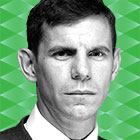This content is from:xinyabo体育app
The 2016 All-Europe Research Team: Technology/Hardware, No. 1: Gareth Jenkins & team
UBS’s Gareth Jenkins guides his regional technology hardware team to a third consecutive No 1 finish.


& team
Total Appearances: 53
Team Debut: 1986
UBS’sGareth Jenkinsguides his regional technology hardware team to a third consecutive No 1 finish. He and one colleague work out of London and join with two teammates in India in reporting on 17 companies. Their expertise on French telecommunications equipment provider Alcatel-Lucent and Netherlands-based semiconductor equipment maker ASML Holding wins enthusiastic praise, with one client offering that the squad “has been hugely instrumental for my decision-making” on these names. Another fund manager hails the group’s “very timely call on Alcatel, supported by an extremely clear breakdown of the business and the higher value of the stock if its turnaround continued. This investment case was difficult for most other sell-side analysts to articulate.” Last month Finland-based wireless networking powerhouse Nokia Corp. completed its acquisition of Alcatel-Lucent. For their part, Jenkins and his colleagues “see 2016 as a year of limited growth across subsectors,” reports the 42-year-old head of coverage. “We model global wireless [capital expenditures] at –7 percent (vendor revenue –1 percent), semiconductors capex flat, smartphone revenue growth of 4 percent (–1 percent at constant currency) and global semis revenue 2 percent. Given the limited growth environment, we have a preference for either self-help cost-reduction investment theses or proven market-share gainers.” Based on the researchers’ analysis of the Alcatel-Lucent deal, they upgraded Nokia from neutral to buy in August, after management announced a weak set of quarterly results. By the middle of last month, the stock had climbed 10.7 percent, to €6.60, compared with the 7 percent loss posted by its regional peers. In November 2014, bucking consensus, they lowered their rating on ASML from a long-standing buy to neutral. “We remain neutral,” Jenkins advises, “as despite admiring the quality of the company and its positioning, we see a full valuation.” ASML’s shares closed at €70.86 in mid-January, having lost 14.7 percent during a period in which Europe’s technology hardware companies overall fell 6 percent. He and his crew are “thoughtful and analytical,” remarks another supporter, with “models that are well put together and allow for stress testing or assumptions changes with simplicity.”
